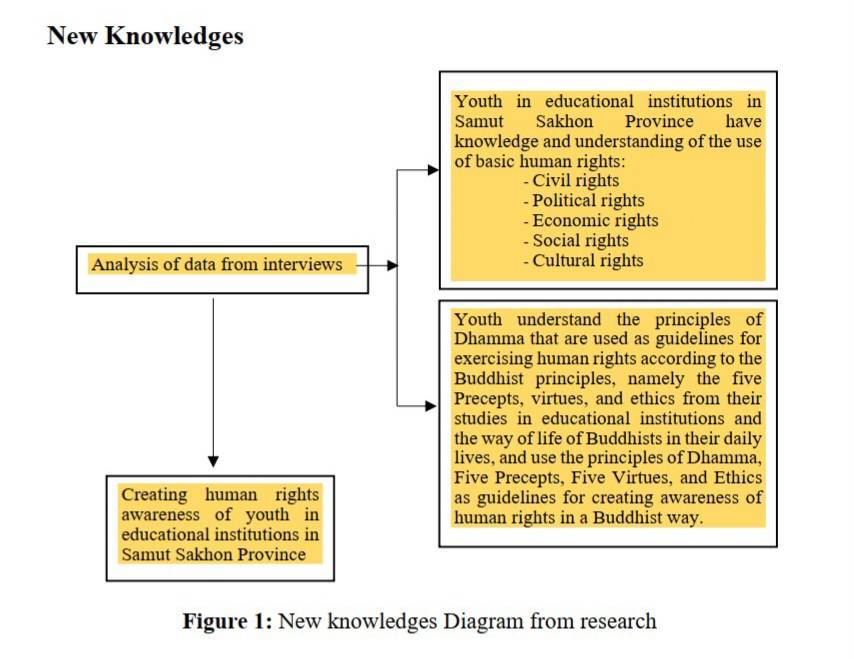CREATING CONSCIOUSNESS OF THE BUDDHIST YOUTH HUMAN RIGHTS IN EDUCATIONAL INSTITUTIONS IN SAMUT SAKHON PROVINCE
Main Article Content
Abstract
This article aims to: 1) Study the knowledge and understanding of human rights among youth in educational institutions in Samut Sakhon Province. 2) Study the understanding of Buddhist-oriented human rights among youth in educational institutions in Samut Sakhon Province. 3) Develop a Buddhist-oriented human rights consciousness among youth in educational institutions in Samut Sakhon Province. This is a qualitative research study utilizing in-depth interviews with 18 key informants, the study found that: Understanding of human rights among youth in educational institutions in Samut Sakhon Province: The youth possess knowledge and understanding of human rights and exercise various fundamental rights within their educational institutions. This includes the right to vote in student council elections, the right to express opinions, equality in exercising rights, equality in access to education, the right to use the institution's public utilities, and non-discrimination based on gender.
Application of Buddhist-oriented human rights among youth in educational institutions: By adhering to the principles of the Five Precepts, the Five Virtues, and ethics, youth understand the use of these principles as a guideline for exercising human rights. They have learned these teachings through their studies of Buddhism in school and through living a Buddhist way of life. They understand the principles of doing good, avoiding evil, and conducting themselves ethically, which includes having compassion and empathy for others.
Development of a Buddhist-oriented human rights consciousness among youth in educational institutions in Samut Sakhon Province: The youth, as students, use the principles of the Five Precepts, the Five Virtues, and ethics as a guideline for exercising human rights. This approach fosters a good moral consciousness. Having a good moral consciousness means understanding right from wrong, knowing how to reason, understanding what should and should not be done, and recognizing what is good and what is not. Cultivating a sense of morality among youth requires cooperation from society, which will help these youths, who are the future of the nation, grow into responsible and good adults.
Article Details
References
Air Chief Marshal Chawarat Mararungruang. (2022). Human rights:
similarities and differences, personal academic documents Law for Democracy Course, Class 4. (Office of the Constitutional Court: Constitutional College, M.P.P.).
Amnesty International Thailand. (2022). Human rights education. Retrieved on
December 1, 2022. from https://www.amnesty.or.th/our-work/hre/.
Charan Disthaapichai. (2001). Human Rights Handbook, Citizen Edition.
National Human Rights Commission. Institute of Policy Studies.
Phra Santhat Thitajaro (Preedasak). (2018). Public consciousness and human
development according to Buddhist principles. Master of Buddhist Studies Thesis Department of Buddhism. Graduate School: Mahachulalongkornrajavidyalaya University.
Phattharaphon Modmonthin. (2016). Integrated Buddhism to develop youth
to be good people. Master of Buddhist Studies Thesis Department of Buddhism. Graduate School: Mahachulalongkornrajavidyalaya University.
Wichai Sangprapai. (2022). Human rights principles in Thailand. (Online).
Source: https://shorturl.asia/wQYRx,5 October 2022.


